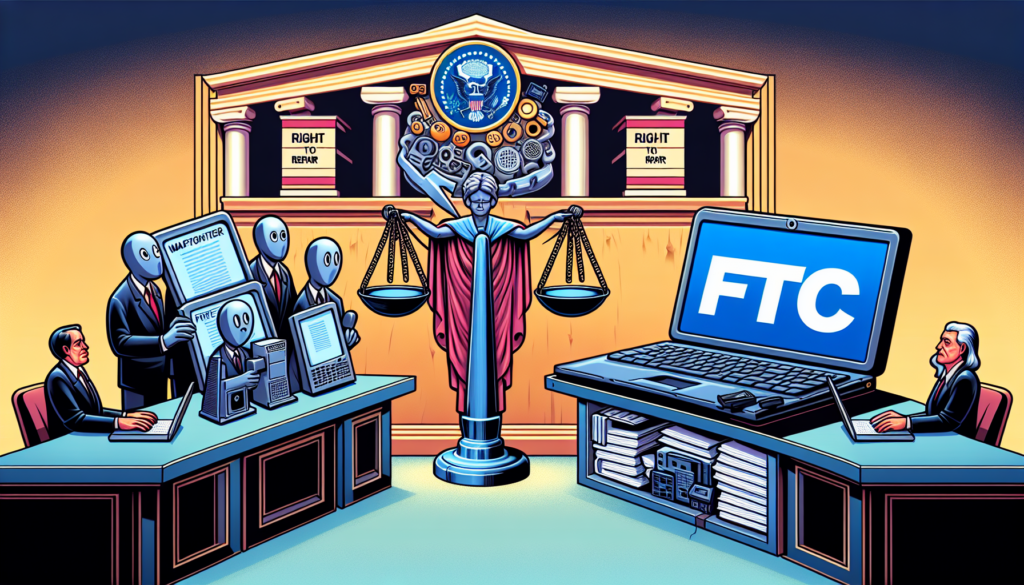
 ## FTC Targets Illegal Warranty Stickers: Essential Information You Should Know
## FTC Targets Illegal Warranty Stickers: Essential Information You Should Know
The Federal Trade Commission (FTC) has recently emphasized to various computer companies that using “warranty void if removed” stickers and similar language is against the law, as it deters consumers from repairing their devices. This action highlights the increasing popularity of the right-to-repair movement, which seeks to give consumers the power to fix their gadgets without risking the loss of their warranties.
Companies Addressed
ASRock, Gigabyte, and Zotac
ASRock, Gigabyte, and Zotac have been specifically mentioned by the FTC. These companies are known for their gaming PCs, graphics cards, motherboards, and related accessories. The FTC’s correspondence demanded the removal of warranty-voiding stickers and clauses that threaten to invalidate warranties if the seals are broken by consumers.
The Issues with Such Practices
Consumer Rights and Routine Repairs
The FTC’s main concern is that these practices obstruct consumers’ ability to carry out routine repairs and maintenance on their products. By placing stickers in areas that block access to key components, companies are restricting consumer rights. This not only inconveniences users but also goes against their legal right to repair items they have purchased.
The Magnuson-Moss Warranty Act
The FTC’s warnings are based on the Magnuson-Moss Warranty Act of 1975. This law stipulates that companies cannot impose repair restrictions unless they either provide the parts or services for free or obtain a waiver from the FTC. This act has been a critical mechanism for protecting consumer rights for almost 50 years.
Historical Background
Previous Actions and Warnings
This is not the first instance where the FTC has acted against such practices. In 2018, similar warnings were sent to six major companies: Nintendo, Sony, Microsoft, ASUS, HTC, and Hyundai. Despite these warnings, some companies have persisted with these unlawful stickers and terms, leading to the current round of enforcement actions.
International Perspective
Differences in Legal Regulations
It is important to note that while these practices are illegal in the United States under the Magnuson-Moss Warranty Act, they may not be banned in other countries. For example, iFixit reported last year that these stickers and policies could still be legal in various international markets. This discrepancy highlights the need for uniform consumer protection standards worldwide.
The Right-to-Repair Movement
Increasing Traction
The right-to-repair movement has gained substantial momentum across numerous U.S. states. Advocates believe that consumers should have the ability to repair their own devices without the risk of voiding warranties or facing other penalties. Legislative successes in states like Massachusetts and New York have further strengthened consumer rights.
Conclusion
The FTC’s recent actions serve as an important reminder for companies to follow existing laws and respect consumer rights. By addressing ASRock, Gigabyte, and Zotac, the Commission aims to set a precedent that discourages other companies from engaging in similar practices. With the continuing growth of the right-to-repair movement, consumers can expect greater freedom and fewer restrictions when it comes to maintaining their own devices.
Q&A
Q1: What is the Magnuson-Moss Warranty Act?
A1: Enacted in 1975, the Magnuson-Moss Warranty Act is a federal law that governs warranties on consumer products, prohibiting companies from imposing repair restrictions unless they provide the parts or services for free or receive a waiver from the FTC.
Q2: Which companies were recently warned by the FTC?
A2: The FTC recently warned ASRock, Gigabyte, and Zotac to remove “warranty void if removed” stickers and similar language from their products.
Q3: Are these warranty-voiding practices illegal worldwide?
A3: No, these practices are not universally illegal. While they are prohibited in the United States under the Magnuson-Moss Warranty Act, they may still be legal in other countries.
Q4: What is the right-to-repair movement?
A4: The right-to-repair movement advocates for consumers’ ability to repair their devices without voiding warranties or facing other penalties. It promotes consumer empowerment and sustainability by reducing electronic waste.
Q5: Has the FTC taken similar actions in the past?
A5: Yes, in 2018, the FTC issued similar warnings to Nintendo, Sony, Microsoft, ASUS, HTC, and Hyundai.
Q6: What could happen if companies fail to comply with the FTC’s warnings?
A6: Failure to comply with the FTC’s warnings within 30 days can lead to law enforcement actions, including fines and other penalties.
For more detailed information on consumer rights and product maintenance, visit Lonelybrand.com.